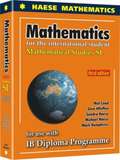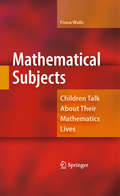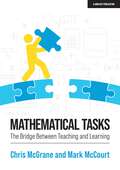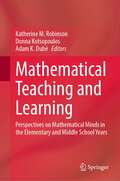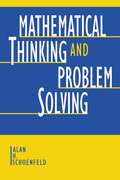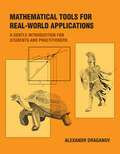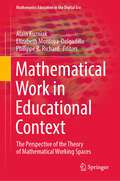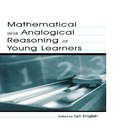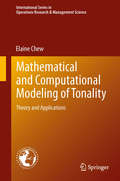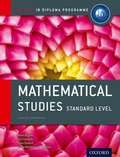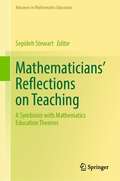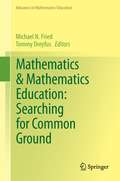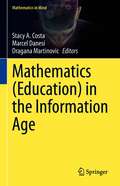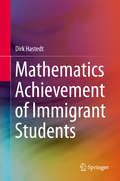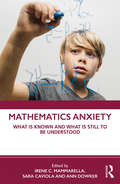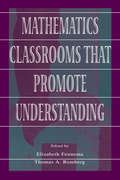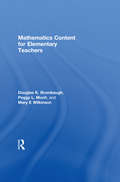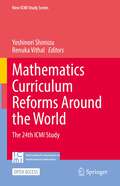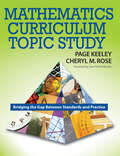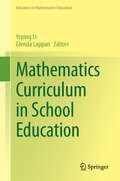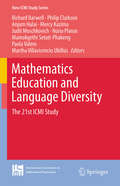- Table View
- List View
Mathematical Studies
by Mal Coad Sandra Haese Glen Whiffen Michael Haese Mark HumphriesMathematics for the International Student: Mathematical Studies SL has been written to embrace the syllabus for the two-year Mathematical Studies SL Course, to be first examined in 2014.
Mathematical Subjects
by Fiona WallsWe know the process by which children become social, moral, and creative beings, but when--and how--do they become mathematical beings? This thought-provoking volume follows ten children (ages seven through eighteen) in schools in New Zealand, England, Australia, Sweden, and an international school in Switzerland as they come to recognize the mathematical as part of their lives, their academic identities, and their identities as human beings. Through these students' experiences important themes emerge, including mathematics as work, a domain of learning, and an avenue for competition; mathematical ability as a key to how they are perceived by others; and the relationships between mathematics achievement and the larger social and academic picture. This comparative study of educational systems and academic development will inform readers in these and other salient areas: Theoretical bases for understanding children as mathematical subjects. Help in creating the mathematical self: tutoring and related programs. The roles of compulsory study and standardized assessment. Class and ethnic content in children's math narratives. The gendering of mathematical ability and activity. What children's math experience can teach us about teaching the subject. Children Talk about Their Mathematics Lives opens bold windows onto how young people learn and how disparities arise, making it a cutting-edge resource for researchers and libraries, graduates and teachers in mathematics education and early childhood education.
Mathematical Tasks: The Bridge Between Teaching and Learning
by Mark McCourt Chris McGraneIf we want our pupils to develop fluency, understanding and the ability to solve complex problems, then it is vital that teachers develop the ability to select, adapt and design appropriate mathematical tasks. In 'Mathematical Tasks: The Bridge Between Teaching and Learning', Chris McGrane and Mark McCourt a range of practical approaches, strategies and principles behind the design and effective use of tasks in the mathematics classroom that lead to all pupils becoming successful learners. First-hand interviews with world class mathematics education experts and practicing teachers bring to life the ideas behind how tasks can act as a bridge between what the teacher wants the pupil to make sense of and what the pupil actually does makes sense of; tasks are how we enable pupils to enact mathematics - it is only by being mathematical that pupils can truly make connections across mathematical ideas and understand the bigger picture. This is a book for classroom teachers. Chris McGrane offers a range of practical examples for nurturing deep learning in mathematics that can be adapted and embedded in one's own classroom practice. This is also a book for those who are interested in the theory behind tasks. Chris and his interviewees examine the key role tasks play in shaping learning, teaching, curriculum and assessment. Suitable for teachers at all stages in their careers and teachers are encouraged to return to the book from time to time over the years to notice how their use of tasks in the classroom changes as they themselves develop.
Mathematical Tasks: The Bridge Between Teaching and Learning
by Mark McCourt Chris McGraneIf we want our pupils to develop fluency, understanding and the ability to solve complex problems, then it is vital that teachers develop the ability to select, adapt and design appropriate mathematical tasks. In 'Mathematical Tasks: The Bridge Between Teaching and Learning', Chris McGrane and Mark McCourt a range of practical approaches, strategies and principles behind the design and effective use of tasks in the mathematics classroom that lead to all pupils becoming successful learners. First-hand interviews with world class mathematics education experts and practicing teachers bring to life the ideas behind how tasks can act as a bridge between what the teacher wants the pupil to make sense of and what the pupil actually does makes sense of; tasks are how we enable pupils to enact mathematics - it is only by being mathematical that pupils can truly make connections across mathematical ideas and understand the bigger picture. This is a book for classroom teachers. Chris McGrane offers a range of practical examples for nurturing deep learning in mathematics that can be adapted and embedded in one's own classroom practice. This is also a book for those who are interested in the theory behind tasks. Chris and his interviewees examine the key role tasks play in shaping learning, teaching, curriculum and assessment. Suitable for teachers at all stages in their careers and teachers are encouraged to return to the book from time to time over the years to notice how their use of tasks in the classroom changes as they themselves develop.
Mathematical Teaching and Learning: Perspectives on Mathematical Minds in the Elementary and Middle School Years
by Katherine M. Robinson Donna Kotsopoulos Adam K. DubéThis book focusses on teaching and learning in elementary and middle school mathematics and suggests practices for teachers to help children be successful mathematical thinkers. Contributions from diverse theoretical and disciplinary perspectives are explored. Topics include the roles of technology, language, and classroom discussion in mathematics learning, the use of creativity, visuals, and teachers’ physical gestures to enhance problem solving, inclusive educational activities to promote children’s mathematics understanding, how learning in the home can enhance children’s mathematical skills, the application of mathematics learning theories in designing effective teaching tools, and a discussion of how students, teachers, teacher educators, and school boards differentially approach elementary and middle school mathematics. This book and its companion, Mathematical Cognition and Understanding, take an interdisciplinary perspective to mathematical learning and development in the elementary and middle school years. The authors and perspectives in this book draw from education, neuroscience, developmental psychology, and cognitive psychology. The book will be relevant to scholars/educators in the field of mathematics education and also those in childhood development and cognition. Each chapter also includes practical tips and implications for parents as well as for educators and researchers.
Mathematical Thinking and Problem Solving (Studies in Mathematical Thinking and Learning Series)
by Alan H. SchoenfeldIn the early 1980s there was virtually no serious communication among the various groups that contribute to mathematics education -- mathematicians, mathematics educators, classroom teachers, and cognitive scientists. Members of these groups came from different traditions, had different perspectives, and rarely gathered in the same place to discuss issues of common interest. Part of the problem was that there was no common ground for the discussions -- given the disparate traditions and perspectives. As one way of addressing this problem, the Sloan Foundation funded two conferences in the mid-1980s, bringing together members of the different communities in a ground clearing effort, designed to establish a base for communication. In those conferences, interdisciplinary teams reviewed major topic areas and put together distillations of what was known about them.* A more recent conference -- upon which this volume is based -- offered a forum in which various people involved in education reform would present their work, and members of the broad communities gathered would comment on it. The focus was primarily on college mathematics, informed by developments in K-12 mathematics. The main issues of the conference were mathematical thinking and problem solving.
Mathematical Tools for Real-World Applications: A Gentle Introduction for Students and Practitioners
by Alexandr DraganovTechniques for applying mathematical concepts in the real world: six rarely taught but crucial tools for analysis, research, and problem-solving.Many young graduates leave school with a solid knowledge of mathematical concepts but struggle to apply these concepts in practice. Real scientific and engineering problems are different from those found in textbooks: they are messier, take longer to solve, and standard solution recipes might not apply. This book fills the gap between what is taught in the typical college curriculum and what a practicing engineer or scientist needs to know. It presents six powerful tools for analysis, research, and problem-solving in the real world: dimensional analysis, limiting cases, symmetry, scaling, making order of magnitude estimates, and the method of successive approximations. The book does not focus on formulaic manipulations of equations, but emphasizes analysis and explores connections between the equations and the application. Each chapter introduces a set of ideas and techniques and then shows how these techniques apply to a series of problems. (Knowledge of algebra and trigonometry, but not calculus, is required.) The final two chapters tie all six techniques together and apply them to two real-world problems: computing the probability of a rare, catastrophic event, and tracking a satellite with a GPS receiver. Readers will learn how to analyze, dissect, and gain insight into the results by using all the techniques presented in earlier chapters—and discover how analysis tools work on problems not concocted for a textbook. The appendix provides solutions to many of the problems found throughout the book. Alexandr Draganov was born and raised in Kyiv, Ukraine; in light of the current war in Ukraine he will donate 100% of his royalties for the first year to support medical and humanitarian efforts there.
Mathematical Work in Educational Context: The Perspective of the Theory of Mathematical Working Spaces (Mathematics Education in the Digital Era #18)
by Alain Kuzniak Philippe R. Richard Elizabeth Montoya-DelgadilloThis book is a friendly and complete introduction to one of the most comprehensive contemporary theories of mathematics teaching and learning. By focusing on mathematical work performed by students and teachers during mathematics session, the theory of Mathematical Workings Spaces (MWS) has opened up new perspectives and avenues on mathematics education and mathematical thinking. In particular, it enables the identification of students' knowledge production processes and helps teachers to shape them. The first part of the book explores the heart of the theory and aims to further describe and understand epistemological and cognitive aspects of mathematical work. The second part develops the different MWS dedicated to observing how this work depends on the expectations of educational systems, how it is formed and taught, and how individuals appropriate it. In the last part, some applications and perspectives are discussed regarding topics of major importance today in mathematics education which relate to technological and digital tools, teacher training and modeling activities. In line with the spirit of the theory, the book was written to reflect the conceptual unity at the heart of the theory of MWS and, at the same time, to show the freedom and diversity of approaches given space therein. Written for researchers and professionals in mathematics education, it offers plenty of concrete examples from different educational systems around the world to illustrate the theoretical concepts and show the applicability of the theory to practice and research.
Mathematical and Analogical Reasoning of Young Learners (Studies in Mathematical Thinking and Learning Series)
by Lyn D. EnglishMathematical and Analogical Reasoning of Young Learners provides foundational knowledge of the nature, development, and assessment of mathematical and analogical reasoning in young children. Reasoning is fundamental to understanding mathematics and is identified as one of the 10 key standards for school mathematics for the new millennium. The book draws on longitudinal and cross-cultural studies, conducted in the United States and Australia, of children's reasoning development as they progressed from preschool through the end of second grade. The multifaceted analysis of young children's development of mathematical and analogical reasoning focuses on individual learners, their learning environments, and the interaction between the two. The multidisciplinary team of authors present multiple perspectives and multiple methodologies, and provide valuable information on organizing and sustaining interdisciplinary and cross-cultural inquiry. Key issues addressed include: *the relationship between mathematical and analogical reasoning; *how changes in children's reasoning relate to the implicit instruction they receive in their classrooms; *analyses of the participating teachers' knowledge, beliefs, and practices with respect to mathematical and analogical reasoning of young learners; and *ways in which we might promote development of mathematical and analogical reasoning in young children. This volume is highly relevant for mathematics educators, researchers in mathematics education, educational psychologists, early childhood teachers, and others interested in mathematical development of young children, in particular, the development of their reasoning processes.
Mathematical and Computational Modeling of Tonality
by Elaine ChewFrom the Preface: Blending ideas from operations research, music psychology, music theory, and cognitive science, this book aims to tell a coherent story of how tonality pervades our experience, and hence our models, of music. The story is told through the developmental stages of the Spiral Array model for tonality, a geometric model designed to incorporate and represent principles of tonal cognition, thereby lending itself to practical applications of tonal recognition, segmentation, and visualization. Mathematically speaking, the coils that make up the Spiral Array model are in effect helices, a spiral referring to a curve emanating from a central point. The use of "spiral" here is inspired by spiral staircases, intertwined spiral staircases: nested double helices within an outer spiral. The book serves as a compilation of knowledge about the Spiral Array model and its applications, and is written for a broad audience, ranging from the layperson interested in music, mathematics, and computing to the music scientist-engineer interested in computational approaches to music representation and analysis, from the music-mathematical and computational sciences student interested in learning about tonality from a formal modeling standpoint to the computer musician interested in applying these technologies in interactive composition and performance. Some chapters assume no musical or technical knowledge, and some are more musically or computationally involved.
Mathematical studies Standard Level: Course Companion (Oxford IB Diploma Programme)
by Jane Forrest Peter Blythe Jim Fensom Paula Waldman de TokmanNumber and algebra 1, Descriptive statistics, Geometry and trigonometry 1, Mathematical models, Statistical applications, Introducing differential calculus, Number and algebra 2, Sets and probability, Logic, Geometry and trigonometry 2, Project, Getting the most out of your GDC, Prior learning.
Mathematicians' Reflections on Teaching: A Symbiosis with Mathematics Education Theories (Advances in Mathematics Education)
by Sepideh StewartThis book opens the case on collaboration among mathematicians and mathematics educators. The authors of this book provide their research and experience based insights on collaboration to inspire the young generation of the mathematics community to engage in productive collaborations and exchange of knowledge early in their careers. These valuable collaborations are anticipated to generate innovative research questions that set new and novel paths for mathematics education research with ample possibilities yet to be realized and discovered.
Mathematics & Mathematics Education: Searching for Common Ground
by Michael N. Fried Tommy DreyfusThis book is the fruit of a symposium in honor of Ted Eisenberg concerning the growing divide between the mathematics community and the mathematics education community, a divide that is clearly unhealthy for both. The work confronts this disturbing gap by considering the nature of the relationship between mathematics education and mathematics, and by examining areas of commonality as well as disagreement. It seeks to provide insight into the mutual benefit both stand to gain by building bridges based on the natural bonds between them.
Mathematics (Mathematics in Mind)
by Marcel Danesi Dragana Martinovic Stacy A. CostaThis book brings together ideas from experts in cognitive science, mathematics, and mathematics education to discuss these issues and to present research on how mathematics and its learning and teaching are evolving in the Information Age. Given the ever-broadening trends in Artificial Intelligence and the processing of information generally, the aim is to assess their implications for how math is evolving and how math should now be taught to a generation that has been reared in the Information Age. It will also look at the ever-spreading assumption that human intelligence may not be unique—an idea that dovetails with current philosophies of mind such as posthumanism and transhumanism. The role of technology in human evolution has become critical in the contemporary world. Therefore, a subgoal of this book is to illuminate how humans now use their sophisticated technologies to chart cognitive and social progress. Given the interdisciplinary nature of the chapters, this will be of interest to all kinds of readers, from mathematicians themselves working increasingly with computer scientists, to cognitive scientists who carry out research on mathematics cognition and teachers of mathematics in a classroom.
Mathematics Achievement of Immigrant Students
by Dirk HastedtThis book examines the mathematics achievement of immigrant students on the basis of data from the IEA Trends in International Mathematics and Science Study (TIMSS). It combines an analysis of large-scale assessment data with an in-depth exploration of policy studies and transforms the insights gained into recommendations on how to promote better education for students with an immigrant background. In a world defined by globalization, education systems face the challenge of providing high-quality education for an increasing number of immigrant students. This book addresses topical questions, such as the circumstances and policies that promote good education, and why some countries are more successful than others in catering for the needs of this very diverse group of students. It provides details on the differences between immigrants and non-immigrants in education, includes case studies on policies of two "successful" countries, and gives hints to policy makers for policies that can help improve the situation for immigrant students in schools.
Mathematics Anxiety: What Is Known, and What is Still Missing
by Sara Caviola Ann Dowker Irene MammarellaFeelings of apprehension and fear brought on by mathematical performance can affect correct mathematical application and can influence the achievement and future paths of individuals affected by it. In recent years, mathematics anxiety has become a subject of increasing interest both in educational and clinical settings. This ground-breaking collection presents theoretical, educational and psychophysiological perspectives on the widespread phenomenon of mathematics anxiety. <P><P>Featuring contributions from leading international researchers, Mathematics Anxiety challenges preconceptions and clarifies several crucial areas of research, such as the distinction between mathematics anxiety from other forms of anxiety (i.e., general or test anxiety); the ways in which mathematics anxiety has been assessed (e.g. throughout self-report questionnaires or psychophysiological measures); the need to clarify the direction of the relationship between math anxiety and mathematics achievement (which causes which). <P><P>Offering a revaluation of the negative connotations usually associated with mathematics anxiety and prompting avenues for future research, this book will be invaluable to academics and students in the field psychological and educational sciences, as well as teachers working with students who are struggling with mathematics anxiety
Mathematics Classrooms That Promote Understanding (Studies in Mathematical Thinking and Learning Series)
by Elizabeth Fennema Thomas A. RombergMathematics Classrooms That Promote Understanding synthesizes the implications of research done by the National Center for Research in Mathematical Sciences on integrating two somewhat diverse bodies of scholarly inquiry: the study of teaching and the study of learning mathematics. This research was organized around content domains and/or continuing issues of education, such as equity and assessment of learning, and was guided by two common goals--defining the mathematics content of the K-12 curriculum in light of the changing mathematical needs of citizens for the 21st century, and identifying common components of classrooms that enable students to learn the redefined mathematics with understanding. To accomplish these goals, classrooms in which instruction facilitated the growth of understanding were established and/or studied. This volume reports and discusses the findings which grew out of this research, and subsequent papers and discussions among the scholars engaged in the endeavor. Section I, "Setting the Stage," focuses on three major threads: What mathematics should be taught; how we should define and increase students' understanding of that mathematics; and how learning with understanding can be facilitated for all students. Section II, "Classrooms That Promote Understanding," includes vignettes from diverse classrooms that illustrate classroom discourse, student work, and student engagement in the mathematics described in Chapter 1 as well as the mental activities described in Chapter 2. These chapters also illustrate how teachers deal with the equity concerns described in Chapter 3. Section III addresses "Developing Classrooms That Promote Understanding." The knowledge of the teaching/learning process gained from the research reported in this volume is a necessary prerequisite for implementing the revisions called for in the current reform movement. The classrooms described show that innovative reform in teaching and learning mathematics is possible. Unlike many volumes reporting research, this book is written at a level appropriate for master's degree students. Very few references are included in the chapters themselves; instead, each chapter includes a short annotated list of articles for expanded reading which provides the scholarly basis and research substantiation for this volume.
Mathematics Content for Elementary Teachers
by Douglas K. Brumbaugh Peggy L. Moch MaryE WilkinsonTHE book for elementary education mathematics content courses! Designed to help prospective teachers of elementary school mathematics learn content beyond the rote level, this text stimulates readers to think beyond just getting the problem right and fosters their development into thoughtful, reflective, self-motivated, life-long learners. It stresses the what and why of elementary school mathematics content. Hints are provided about how to teach the content but this is mostly left to courses and texts that are dedicated to that purpose.The text is organized around the National Council for Teachers of Mathematics' Principles and Standards for School Mathematics. The Standards dictate the basic sections of the text. Within each section, appropriate specific topics are developed, intertwined with technology, problem solving, assessment, equity issues, planning, teaching skills, use of manipulatives, sequencing, and much more. In addition, major focal points of the Standards are emphasized throughout: effective teachers of mathematics should be able to motivate all students to learn, should understand the developmental levels of how children learn, should concentrate on what children need to become active participants in the learning environment, and should be engaged in ongoing investigations of new mathematical concepts and teaching strategies.Mathematics Content for Elementary Teachers is based on several fundamental premises:*The focus of mathematics education should be on the process, not the answer.*Elementary teachers should know the mathematics content they are teaching, know more than the content they are teaching, and teach from the overflow of knowledge.*It is important for teachers to be flexible in allowing students to use different procedures--teaching from the "overflow of knowledge" implies knowing how to do a given operation more than one way and being willing to examine many different ways.*Teachers need to learn to carefully cover the topics to be taught, to reflect upon them, and to be able to organize them. To help prospective elementary teachers concentrate on the mathematics content they will be expected to teach and begin to build the foundation for the methods they will use, this text includes only elementary mathematics content and does not address middle school concepts.Pedagogical features:*The text is organized according to NCTM Standards.*An informal writing style speaks directly to readers and is geared to pre-service teachers.*Focus is given to multiple methods of problem solving at four developmental levels.*Questions, exercises, and activities are interspersed throughout each section rather than gathered at the end of each chapter.*Complete solutions for exercises are provided.
Mathematics Curriculum Reforms Around the World: The 24th ICMI Study (New ICMI Study Series)
by Renuka Vithal Yoshinori ShimizuThis Open Access volume by the International Commission on Mathematical Instruction (ICMI) is an outcome of the ICMI Study 24 and gives a status-quo of school mathematics reform around the world and what we can learn from this movement. Each theme and section of the book offers descriptions and analyses of multiple case studies in different countries and contexts, along with opportunities to compare, contrast and learn from these diverse experiences. The volume provides a synthesis and meta-analysis of the different historical, geographical and global aspects of school mathematics reforms and explores in which way curricula are elaborated, proposed, changed, and reorganized. It offers a more informed and comprehensive analysis of the roles of different actors and of the many aspects influencing and shaping mathematics curriculum reforms that are taking or have taken place. It also explores the possibilities and means to tackle a curricular reform in the current scenario we livein and how to unfold future developments. This book will be of interest to practitioners and scholars with an interest in school mathematics curriculum reforms. It will also be a useful resource to those involved in school mathematics curriculum reform initiatives by providing current information about the curriculum changes that are taking place in respect of content, teacher education, educational materials, and a range of implementation challenges across diverse contexts.
Mathematics Curriculum Topic Study: Bridging the Gap Between Standards and Practice
by Cheryl Rose Tobey Page D. KeeleyThe Curriculum Topic Study (CTS) process provides a professional development strategy that links mathematics standards and research to curriculum, instruction, and assessment.
Mathematics Curriculum in School Education
by Glenda Lappan Yeping LiMathematics curriculum, which is often a focus in education reforms, has not received extensive research attention until recently. Ongoing mathematics curriculum changes in many education systems call for further research and sharing of effective curriculum policies and practices that can help lead to the improvement of school education. This book provides a unique international perspective on diverse curriculum issues and practices in different education systems, offering a comprehensive picture of various stages along curriculum transformation from the intended to the achieved, and showing how curriculum changes in various stages contribute to mathematics teaching and learning in different educational systems and cultural contexts. The book is organized to help readers learn not only from reading individual chapters, but also from reading across chapters and sections to explore broader themes, including: Identifying what is important in mathematics for teaching and learning in different education systems; Understanding mathematics curriculum and its changes that are valued over time in different education systems; Identifying and analyzing effective curriculum practices; Probing effective infrastructure for curriculum development and implementation. Mathematics Curriculum in School Education brings new insights into curriculum policies and practices to the international community of mathematics education, with 29 chapters and four section prefaces contributed by 56 scholars from 14 different education systems. This rich collection is indispensable reading for mathematics educators, researchers, curriculum developers, and graduate students interested in learning about recent curriculum development, research, and practices in different education systems. It will help readers to reflect on curriculum policies and practices in their own education systems, and also inspire them to identify and further explore new areas of curriculum research for improving mathematics teaching and learning.
Mathematics Curriculum, Teacher Professionalism, and Supporting Policies in Korea and the United States: Summary of a Workshop
by Ana FerrerasOn July 15-17, 2012 the United States National Commission on Mathematics Instruction and Seoul National University held a joint Korea-U. S. workshop on Mathematics Teaching and Curriculum. The workshop was organized to address questions and issues related to math teaching and curriculum that were generated by each country, including the following: What are the main concerns in the development of the curriculum? What issues have been discussed or debated among curriculum developers, teachers, teacher educators, and scholars regarding the curriculum? How have textbooks been developed for the curriculum? How are curricular tasks designed and what criteria are used? What is the role of learning trajectories in the development of curriculum? This report summarizes the presentations and discussions at the workshop.
Mathematics Education and Language Diversity
by Anjum Halai Richard Barwell Philip Clarkson Mercy Kazima Judit Moschkovich Núria Planas Mamokgethi Setati-Phakeng Paola Valero Martha Villavicencio UbillúsThis book examines multiple facets of language diversity and mathematics education. It features renowned authors from around the world and explores the learning and teaching of mathematics in contexts that include multilingual classrooms, indigenous education, teacher education, blind and deaf learners, new media and tertiary education. Each chapter draws on research from two or more countries to illustrate important research findings, theoretical developments and practical strategies.
Mathematics Education and Language Diversity: The 21st ICMI Study (New ICMI Study Series #18)
by Anjum Halai Richard Barwell Philip Clarkson Mercy Kazima Judit Moschkovich Núria Planas Paola Valero Martha Villavicencio Ubillús Mamokgethi Setati Phakeng*THIS BOOK WILL SOON BECOME AVAILABLE AS OPEN ACCESS BOOK*This book examines multiple facets of language diversity and mathematics education. It features renowned authors from around the world and explores the learning and teaching of mathematics in contexts that include multilingual classrooms, indigenous education, teacher education, blind and deaf learners, new media and tertiary education. Each chapter draws on research from two or more countries to illustrate important research findings, theoretical developments and practical strategies.This open access book examines multiple facets of language diversity
Mathematics Education and Philosophy: An International Perspective (Studies In Mathematics Education Ser. #No. 3)
by Paul ErnestCurrently there is a great deal of interest in philosophical issues in the teaching and learning of both mathematics and science education. In this book Ernest has collected together papers from the foremost researchers and practitioners in the philosophy of mathematics education and related areas, together with a selection of papers from the International Congress of Mathematics Education held in Quebec in 1992. Throughout, the outstanding feature of the collection is its multidisciplinary approach to the field of study. This book is the second in Paul Ernest's "Studies in Mathematics Education" series.
